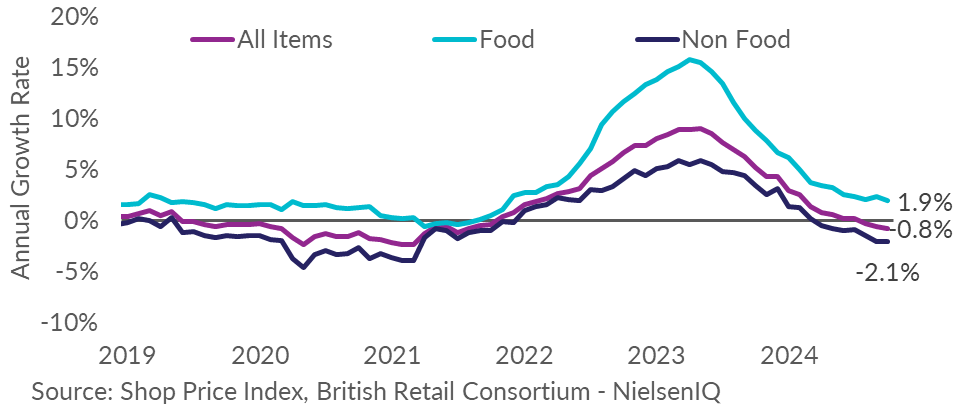Period Covered: 01 – 07
October 2024
- Shop Price deflation was at 0.8% in October, down from
deflation of 0.6% in the previous month. This is below the
3-month average rate of -0.6%. Shop price annual growth was at
its lowest rate since August 2021.
- Non-Food remained in deflation at -2.1% in October, unchanged
from the preceding month. This is below the 3-month average rate
of -1.9%. Inflation is at its lowest rate since March 2021.
- Food inflation slowed to 1.9% in October, down from 2.3% in
September. This is above the 3-month average rate of 2.1%. The
annual rate continues to ease in this category and inflation
remained at its lowest rate since November 2021.
- Fresh Food inflation decelerated in October, to 1.0%, down
from 1.5% in September. This is below the 3-month average rate of
1.2%. Inflation was its lowest since October 2021.
- Ambient Food inflation decelerated to 3.1% in October, down
from 3.3% in September. This is below the 3-month average rate of
3.3% and remained at its lowest since March 2022.
|
|
OVERALL SPI
|
FOOD
|
NON-FOOD
|
|
% Change
|
On last year
|
On last month
|
On last year
|
On last month
|
On last year
|
On last month
|
|
Oct-24
|
-0.8
|
0.1
|
1.9
|
0.0
|
-2.1
|
0.1
|
|
Sep-24
|
-0.6
|
-0.2
|
2.3
|
0.2
|
-2.1
|
-0.5
|
Note: Month-on-month % change refers to changes in the
level of prices.

Helen Dickinson OBE, Chief Executive of the BRC,
said:
“October saw shop prices fall marginally further into deflation
for the third consecutive month. Food inflation eased,
particularly for meat, fish and tea as well as chocolate and
sweets as retailers treated customers to spooky season deals. In
non-food, discounting meant prices fell for electricals such as
mobile phones, and DIY as retailers capitalised on the recent
pick-up in the housing market. With fashion sales finally turning
a corner this Autumn, prices edged up slightly for the first time
since January as retailers started to unwind the heavy
discounting seen over the past year.”
“Households will welcome the continued easing of price inflation,
but this downward trajectory is vulnerable to ongoing
geopolitical tensions, the impact of climate change on food
supplies, and costs from planned and trailed Government
regulation. Retail is already paying more than its fair share of
taxes compared to other industries. The Chancellor using
tomorrow's Budget to introduce a Retail Rates Corrector, a 20%
downwards adjustment, to the business rates bills of all retail
properties will allow retailers to continue to offer the best
possible prices to customers while also opening shops, protecting
jobs and unlocking investment.”
Mike Watkins, Head of Retailer and Business Insight,
NielsenIQ, said:
“Inflation in the food supply chain
continues to ease and this helped slow the upward pressure of
shop price inflation in October, however other cost pressures
remain. Consumers remain uncertain about when and where to spend
and with Christmas promotions now kicking in, competition for
discretionary spend will intensify in both food and non-food
retailing.”
